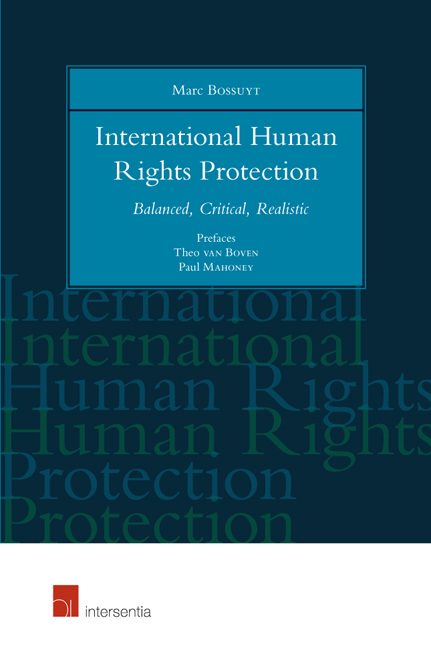Book contents
- Frontmatter
- Dedication
- Preface: A Lifetime of Fidelity and Participation
- Preface: A Penetrating and Salutary Analysis of the European System of Human Rights Protection
- Introduction
- Contents
- Epigraph
- PART ONE International Protection of Human Rights in General
- PART TWO Specific Human Rights Protection
- A Some Specific Human Rights Issues
- B Some Specific Human Rights Regimes
- Annex: At the Crossroads of Law and Politics
- Bibliographies
- About the Author
A - Some Specific Human Rights Issues
from PART TWO - Specific Human Rights Protection
Published online by Cambridge University Press: 25 September 2018
- Frontmatter
- Dedication
- Preface: A Lifetime of Fidelity and Participation
- Preface: A Penetrating and Salutary Analysis of the European System of Human Rights Protection
- Introduction
- Contents
- Epigraph
- PART ONE International Protection of Human Rights in General
- PART TWO Specific Human Rights Protection
- A Some Specific Human Rights Issues
- B Some Specific Human Rights Regimes
- Annex: At the Crossroads of Law and Politics
- Bibliographies
- About the Author
Summary
By way of an example showing the importance procedural issues may have in defining international norms and in setting up monitoring bodies, a detailed analysis is given of such a discussion at the final day of the World Conference against Racism of 2001 in Durban (Chapter VIII).
Another issue concerns the internal applicability in domestic law of the provisions of human rights treaties, with particular reference to the European Convention on Human Rights and to the International Covenant on Civil and Political Rights (Chapter IX).
A more substantive issue is the death penalty which has not been prohibited by the main human rights conventions. Progressively, protocols aiming at the abolition of that penalty, additional to the International Covenant on Civil and Political Rights and to the European and the American Conventions on Human Rights, have been adopted. More recently, the European Court of Human Rights of Strasbourg has interpreted Article 3 of the European Convention (prohibiting torture and inhuman punishment) as opposing the imposition of irreducible life sentences both in a domestic context and in the context of extradition requests (Chapter X).
At the European level, the question may be raised whether there are limits to the jurisdiction of the Court of Strasbourg: is the Court competent to continuously impose additional obligations on the States parties to the European Convention which go manifestly beyond the original intentions of its drafters (Chapter XI)?
An analysis will be made of the developments of the case law of the same European Court with respect to positive obligations. Questions will be raised as to the dangers caused by “dynamic” interpretations tending to create new obligations without democratic legltimation (Chapter XII).
- Type
- Chapter
- Information
- International Human Rights ProtectionBalanced, Critical, Realistic, pp. 89 - 90Publisher: IntersentiaPrint publication year: 2016

